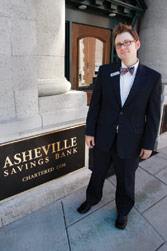With all the turmoil and confusion in the financial sector, it’s easy to believe that the carnage is endemic. But while the pall of doom is all too real, not every financial institution is in peril.

For every belly-up behemoth such as IndyMac or Washington Mutual, or severely troubled institution such as the Charlotte-based Wachovia (which holds 20 percent of all deposits in the region and is now being acquired by Wells Fargo), there are thousands that have sidestepped the current catastrophe. They’re mostly old-fashioned community banks and credit unions, and Western North Carolina is home to plenty of them.
Asheville Savings Bank—the oldest locally managed, independent financial institution in Buncombe County—has $678 million in assets, and the figure is growing rapidly as bigger banks falter. Chartered in 1936 as a mutual bank, it has 12 offices staffed by 165 employees in Buncombe, Henderson, McDowell, Madison and Transylvania counties.
Assistant Vice President Jarrod Perkins, who came on board recently after having worked for the Charlotte-based Bank of America, says that what sets his bank apart is simple.
“The first thing is, we’re a mutual bank. We don’t have stock or stockholders or anything like that. Our decisions are just made on the direction we want to take with the bank and what is going to be best for the customers—and not what is going to be better for our stock price.” (The beleaguered Washington Mutual, incidentally, converted from a mutual to a stock-owned bank in 1983. One of the nation’s largest banks, it was recently acquired by JPMorgan Chase to prevent its failure.)
“That’s a huge difference right there,” Perkins says about his bank’s mutual status. “At Bank of America, everything had to do with image: What are stockholders going to think? We don’t have that, which is awesome.”
And since the current financial-sector mess stemmed largely from the subprime-lending meltdown, Perkins emphasizes another key difference: Local community banks typically don’t make subprime loans or invest in troubled or risky securities.
“We’ve just been a very conservative lender. That’s how we’ve been able to avoid having any foreclosures on the books. … We can kind of do things on our terms: We try to creatively help as many people as we can, but we’re going to be careful about it. Without stockholders, there’s no big bailout there, but we can’t screw ourselves at the same time,” he says.
As of Sept. 30, says Perkins, Asheville Savings had almost $600 million in loans in its five-county market area: prime residential mortgages, home-equity loans, auto loans and local commercial and small-business loans. “We are required by state and federal regulators to maintain at least 10 percent of our assets in liquid assets, which would be cash on deposit and securities,” he notes.
“Our primary deposit account is maintained with the Federal Home Loan Bank of Atlanta, and our fixed-income securities are primarily bonds that we have purchased and which are backed by government agencies. We do not own any of the collateralized debt obligations or other more ‘exotic’ securities that have been the demise of the investment-banking firms. Nor do we own any equity securities, such as the Freddie Mac preferred stock which has been the subject of many news reports.”
Even stock-owned community banks are weathering the financial storm in similar fashion. The Bank of Asheville is a good example. Its practices and financial health recently won a coveted five-star safety rating from BauerFinancial, an independent bank examiner and rating firm based in Florida.
“This recognition gives us the distinction of being rated one of the safest banks in the country,” says President and CEO G. Gordon Greenwood. “BauerFinancial has been rating financial institutions for 25 years; ratings are not paid for by the institutions, nor can they elude them.”
Only one-third of the nation’s banks have been awarded five stars—the highest level of banking performance, says Greenwood.
Meanwhile, some Wall Street giants are starting to pay heed to the safety and conservatism inherent in community banks. Global investment-banking giants Goldman Sachs and Morgan Stanley recently won Federal Reserve Board approval to become bank holding companies. Besides helping them increase assets (by enabling them to accept more government-insured consumer deposits), it will subject them to greater regulatory scrutiny and stricter capital-reserve and other requirements.
“Our banks have been doing bread-and-butter, good old-fashioned banking a long time,” notes Steve Verdier, senior vice president of the Independent Community Bankers of America, which represents 5,000 of the nation’s approximately 8,000 community banks.
“We’re flattered that the big banks are trying to get back to basics, but we think we’ll do better than them,” Verdier recently told the Investor’s Business Daily. “It’s easier to do what you’ve already been doing.”
And even large traditional banks such as Wachovia are learning a lesson from their smaller brethren—in the form of lost business.
“When these other banks are either going belly up or they hear the horror report on the news, people are going to come to us, because they feel better with a little hometown bank versus a large bank that just lost $15 billion,” Perkins asserts.
““When that whole Wachovia thing hit, we got a ton of business,” he adds. “People would come and ask questions about the stability of our bank. We’d tell them, and they were like, ‘OK, we’re moving over here.’ And they usually end up moving quite a bit of money. I had one guy walk in and he was planning to go to a lot of different banks to distribute the money out, but he ended up handing me over $700,000. Same day, a woman from my office had someone with $400,000. There’s a lot of money in Asheville.”
And until the banking situation corrects itself, a lot of that dough will probably be going to the plain-vanilla little bank down the street.


While others have failed, ‘Asheville Savings Bank’ has won on a coveted five-star safety rating from BauerFinancial. Really amazing, a place where we can rely.